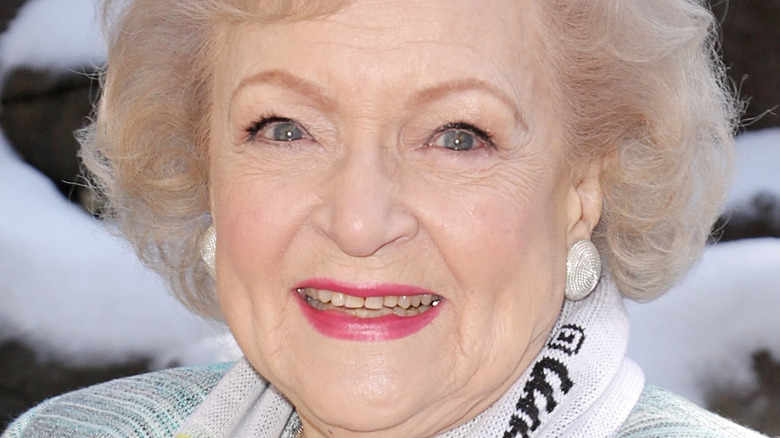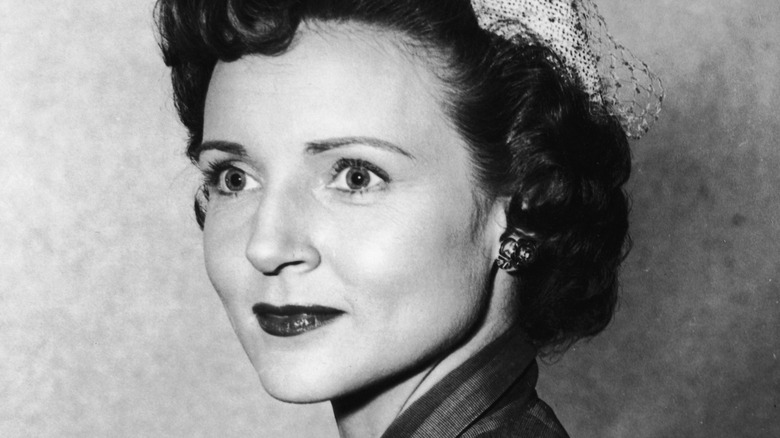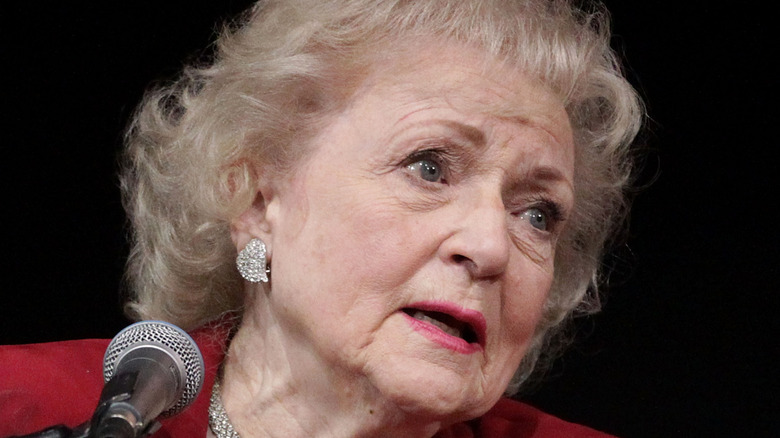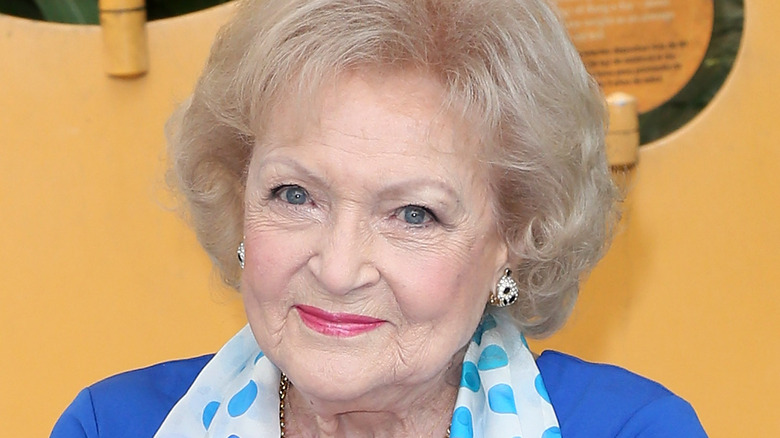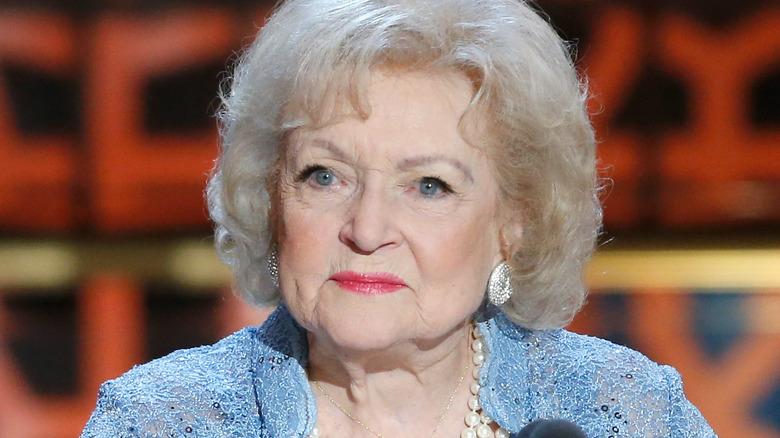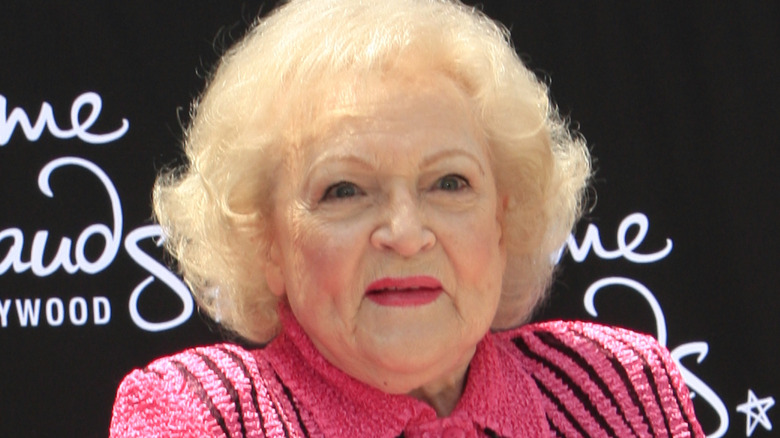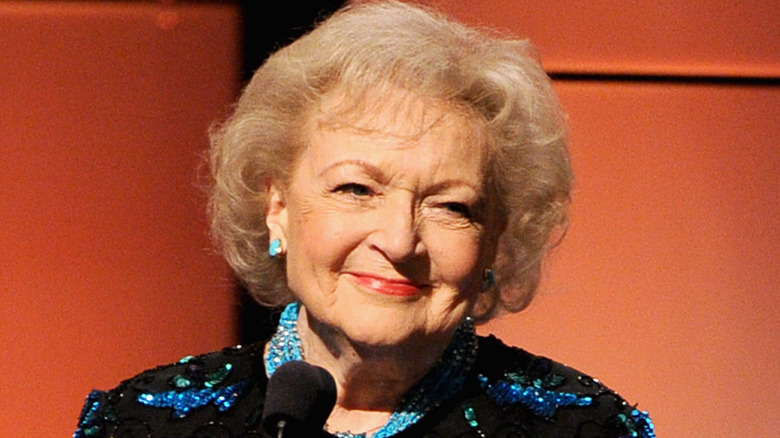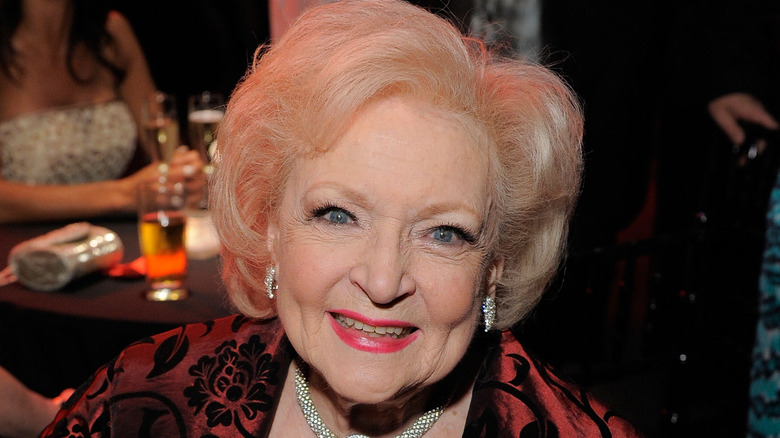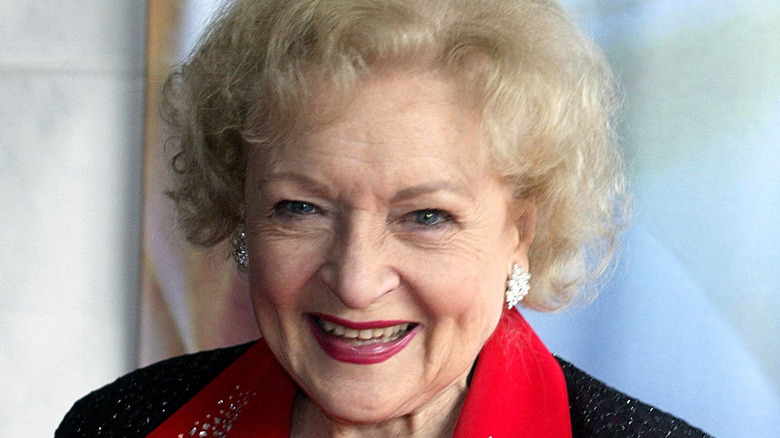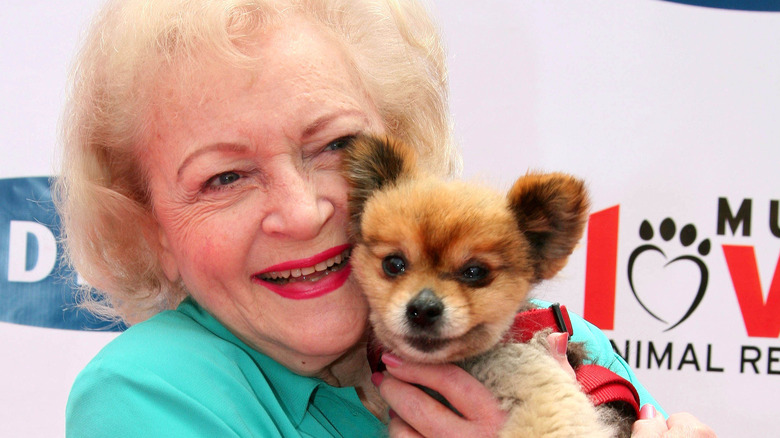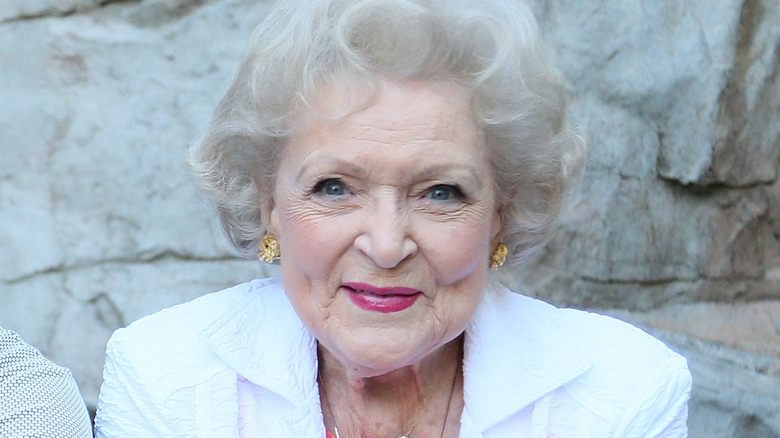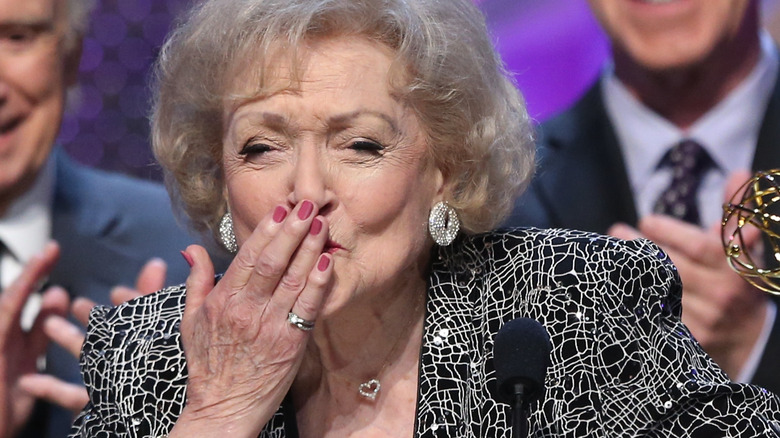Tragic Details About Betty White
The death of Betty White at the age of 99 has devastated fans. Mere days shy of her 100th birthday, White's demise on New Year's Eve spelled a tragic end for an already challenging 2021. The beloved actor will forever leave an indelible mark on the lives of the people — and, indeed, the animals — whose hearts she touched.
Unlike other stars who emerged in the advent of television in the 1950s, many of whom are often viewed as the relics of a bygone era, White kept up with the times. A passionate LGBTQ+ ally, for example, White embraced the community with glee, famously telling Parade in 2010, "There are gay relationships that are more solid than some heterosexual ones — I think it's fine if they want to get married. I don't know how people can get so anti-something." And as for that wicked sense of humor? There aren't many nonagenarians who would pay a NSFW tribute to Ryan Reynolds, whom she deemed "so f***ing handsome in his red leather suit" as Deadpool. The actor aged like a fine vino, her tongue as sharp as a bottle of (Betty) White wine. As her "Golden Girls" alter ego, Rose, once quipped, "The older you get, the better you get, unless you're a banana."
But beneath that risible demeanor lay a tragic side to the iconic star. In both her personal and professional life, White endured numerous tribulations. These are the tragic details about Betty White, many of which she was able to guard from the public.
Betty White struggled during the Great Depression
The Great Depression devastated the livelihoods of millions of Americans, and its detrimental effects were felt across society for many years after. In search of a better life for their daughter, Betty White's parents moved from Illinois to California in the midst of the Depression, but they faced financial hardships. Speaking with the Archive of American Television, White discussed the impact of the economic crisis when growing up.
"My dad was still working for [electric company] Crouse-Hinds, but nobody was making any money, and so to make added income he started making radios ... and he would sell them as a side line. Well, of course it was the middle of the Depression and nobody had any money, so he didn't sell a lot of radios," she reflected. The actor went on to explain that her father didn't make the wisest financial decision when he decided to trade radios for dogs, at one point ending up "with 20 dogs," whom the family struggled to feed. The decision was, as White put it, "not the best business thing in the world."
Despite the difficulties she endured, her father's canine commitment ultimately had a positive effect on White, as it instilled a love of animals within her. "My parents had a cat named Toby who liked to sit on my crib. My mom always said that if Toby hadn't approved of the baby, she'd have gone straight back to the hospital," she darkly joked to Parade.
Sexism hindered Betty White's childhood dreams
Growing up in the male-dominated society of the 1920s and '30s, Betty White experienced sexist discrimination. In fact, her initial childhood dream was to become a forest ranger, but those dreams were shattered by patriarchal traditions. "But back then, girls were not allowed to become forest rangers," she told ABC News. Shockingly, Forest History notes that it wasn't until 1978 that women could be forest rangers, with a 1950s pamphlet claiming that "the fieldwork of the Forest Service is strictly a man's job."
Per Time, White once said, "In my heart I've been a forest ranger all my life, but now I'm official." This referenced her finally being made an honorary forest ranger in 2010. Upon being bestowed the title she had always wanted, U.S. Forest Service Chief Tom Tidwell somberly acknowledged the sexist discrimination that had prevented White from fulfilling her ambition all those decades earlier. "I am sorry you couldn't join us before," Tidwell said, per the Forest Service. "Judging from your illustrious career, you would have made marvelous contributions to our agency and to the cause of conservation across the United States. Betty, you are a role model for little girls — for all of us — never to give up on our dreams."
The significance of the award was not lost on White, who told ABC News, "I was so pleased to look out and see all those women in their ranger uniforms."
Betty White's first two marriages were unhappy
In 1945, Betty White married for the first time to Dick Barker, who lived on a chicken farm. In an interview with People, White described her rather unglamorous life with Barker as "a nightmare," and the pair divorced mere months after tying the knot.
She elaborated on the relationship in a chat with AARP, explaining that the puritanical nature of the 1940s led to the couple's unhappy marriage. "I would not have married my first or second husbands. I married my first because we wanted to sleep together. It lasted six months, and we were in bed for six months," she confessed.
As for her second failed marriage to Lane Allen, White revealed that he pressured her into giving up her Hollywood dreams. "The second time I was deeply in love, but he wanted me to get out of show business — a deal breaker," she stated. Speaking with Closer Weekly, White acknowledged that the patriarchal constraints of the era led to the dissolution of her marriage to Allen, particularly her desire to remain childless. "With Lane, it was my failure to live up to the kind of wife he wanted to have," she explained. "I knew that I wasn't going to be content to just stay home. I knew that a career was very much in my future, so I decided not to have children. In those days, people didn't understand that as much as they do now."
The actor's early career was marred by racism
Betty White was renowned for supporting progressive causes, and her career subsequently suffered for her passionate convictions. In the 1950s, White snagged her eponymous variety show, but her glittering fame abruptly came to a halt when she stood up for the rights of the marginalized. When African American tap dancer Arthur Duncan appeared on her show in 1954, there was a racist backlash resulting in calls for the talented performer to be fired. As reported by The Washington Post, White gave a pithy but powerful response: "Live with it."
The show was taken off the air that same year. While it remains a matter of dispute whether Duncan's presence was the reason for "The Betty White Show's" premature cancellation, the racist furor in which its termination was mired is undeniable. White has suggested that her support of Duncan played a role in the show's end. "And all through the South, there was this whole ruckus," White said, per The Washington Post. "They were going to take our show off the air if we didn't get rid of Arthur, because he was Black."
It was a tragic reality of the time that Black people were routinely discriminated against. As an ally, White's career faltered for a time thereafter, with WFMU noting that she experienced a period of career stagnation following the cancellation of her titular vehicle. But White did the right thing in defending Duncan, and that is how fans will always remember her.
Inside Betty White's relationship with her stepdaughter
In 1963, Betty White married for the third and final time, but the relationship was initially blighted by tragedy. When White met Allen Ludden, he was the host of the popular series "Password," but beneath the cheerful façade of the game show, Ludden was suffering immeasurable heartache. "Just as 'Password' started, his wife was dying of cancer," White told the Archive of American Television. "So he would go from the hospital over, do the show, and to do a new show takes a lot of concentration without certainly that. And the week that I did 'Password' ... was the week she died." Ludden's wife, Margaret, left behind three children, aged "9, 10, and 13" at the time.
White and Ludden bonded and wed sometime after. But his daughter, Martha, did not take too kindly to White. As reported by Pop Crunch (via Closer Weekly), Martha reportedly harbored intense anger toward her new stepmom. "Martha was young and she deeply opposed the marriage. She was very angry at her father and made it clear she did not like Betty," a source revealed.
This alleged animosity wasn't easy on the beloved "Golden Girls" star, as her new hubby and stepdaughter reportedly argued incessantly over White. "Allen used to argue with Martha constantly over her anger towards Betty," the insider added. However, it's possible that the pair patched things up, with Closer Weekly reporting that White would celebrate her 98th birthday with her stepchildren.
She lost her mom and husband within a few years
In 1981, Allen Ludden died of stomach cancer after slipping into a coma at the age of 62, as reported by The New York Times. Betty White and Ludden had been married for almost 20 years, and the loss devastated her. To make a tragic situation even sadder, White's mother died just four years later when she first began her role as Rose on "The Golden Girls," as did co-star Bea Arthur's mom.
In what was perhaps a cathartic turn of events, White re-enacted her two bereavements on screen when filming the episode "The Heart Attack." In the Season 1 episode, Rose recalls the death of her husband, and it proved to be a particularly painful scene for the actor to perform in the wake of both losses. "We were ready to shut down the show for as long as they needed," director Lex Passaris revealed to Closer Weekly. "But both ladies said, 'No. We need to work.'" As Passaris continued, "Rose tells a story about her husband Charlie's death, and Betty's basically talking about Allen [Ludden]. Betty's voice kind of cracked and she took a breath and said to me, 'I'd give anything to have that year of my life back again.'"
Following Ludden's death, White tried to put on a brave face, but beneath it all she was — understandably — in unbearable pain. "If one more person said, 'Oh, you're so strong,' I would have decked them," White admitted, per People.
Betty White has one devastating regret about her late husband
When a loved one dies, many people wish that they could have just one more moment with the deceased, one more hug, one more chance to say, "I love you." For Betty White, this self-introspection was all the more tragic because she could have enjoyed more time with Allen Ludden had she accepted his initial romantic gestures.
In an emotional interview on "Where Are They Now?" with Oprah Winfrey, White revealed that she deeply regretted turning down Ludden's first marriage proposal, lamenting that she could have had one more year with the love of her life. "I spent a whole year, wasted a whole year that Allen and I could have had together, saying, 'No, I wouldn't marry him. No, I won't. No, I won't leave California. No, I won't move to New York,'" she admitted to Winfrey. "I wasted a whole year we could have had together."
Speaking with AARP, White reflected on the missed opportunity with pathos. "Allen and I missed our 18th anniversary by three days," she said. "We were doing summer stock together, and every morning he would ask me to marry him. I'd been divorced twice and didn't want to marry again. He bought me a beautiful ring, and I threw it back at him, so he wore it on a chain around his neck. D**n wedding ring! He said, 'I'm going to wear it till you put in it on your finger.' He was a good salesman."
The actor's close friend Liberace died of HIV/AIDS complications
In the '80s, the HIV/AIDS epidemic caused widespread homophobia and hysteria, as the public erroneously believed it to be a virus spread exclusively by gay men, as per NBC News. As a lifelong champion of LGBTQ+ rights, Betty White was extremely close friends with Liberace. The famed pianist was closeted and often used his gal pal as his "beard" to deflect attention away from rumors regarding his sexuality, as White told Joy Behar in an interview for CNN. Tragically, Liberace died of AIDS-related pneumonia in 1987, as reported by The New York Times. "Lee [Liberace] was a great and dear personal friend. ... I loved Lee, he was one of the nicest people you'd ever want to know," White poignantly reflected to Behar.
Three years after the performer's death, "The Golden Girls" did a Season 5 episode entitled "72 Hours," which addressed HIV/AIDS with unique sensitivity and insight for the time. The cultural significance of the episode was not lost on White, having witnessed her friend succumb to the deadly virus. "Not only were people understandably afraid of AIDS, but a lot of people wouldn't even admit it existed. So this was a daring episode to do, and the writers went straight for it," White told Vulture.
As The Daily Beast wrote after White's death, "When you're beloved you have power. She used that power for the animals and for the LGBT community, which matters more than we may take for granted now."
Betty White was allegedly targeted by this co-star
Much has been made of the supposed long-running feud between Betty White and her "Golden Girls" co-star, Bea Arthur. In 2011, White addressed the rumors, claiming that Arthur intensely disliked her and made her life difficult on set. "Bea had a reserve. She was not that fond of me," White alleged, per The Village Voice. "She found me a pain in the neck sometimes. It was my positive attitude — and that made Bea mad sometimes. Sometimes if I was happy, she'd be furious!"
Jim Colucci, author of "Golden Girls Forever: An Unauthorized Biography," opened up to Fox News about Arthur's allegedly difficult on-set behavior. "If you were chewing gum on the set, she would try to have you fired," he divulged. Moreover, Arthur's son, Matthew Saks, revealed that his mother took issue with White's willingness to chat with fans between takes. "I think my mom didn't dig that. ... Betty was able to do it and it didn't seem to affect her. But it rubbed my mom the wrong way," he told The Hollywood Reporter.
Additionally, Saks explained to the publication that part of Arthur's dislike of White stemmed from her belief that her co-star wasn't a true thespian. "I think she felt she was more of an actress than Betty. Mom came from Broadway. Betty starred on a game show at one point," Saks expounded, though he claimed that his mom and White were more frenemies as opposed to arch nemeses.
Many of the star's beloved pets passed away
A renowned animal welfare advocate throughout her life, Betty White enjoyed the company of numerous pets. In fact, she told TV Guide in 2009 that her animal welfare work meant more to her than acting. "I've loved animals since I was in the womb," she stated. Sadly, a number of White's beloved furbabies died around this time, leaving her with just her golden retriever, Pontiac. In 2008, she had to endure the loss of three of her pets within the space of a couple of months. "About a year ago, I lost my 16-and-a-half-year-old Shih Tzu, my 10-year-old golden and my 11-year-old Himalayan kitty all within two months of each other. I was absolutely devastated," she told TV Guide.
In another tragic turn of events, White also outlived Pontiac, who died in 2017, according to People. Poignantly, the actor's personal assistant, Kiersten Mikelas, told the outlet that White decided to forgo adopting any other animals following her dog's death, as she couldn't bear the thought of having to part ways. She didn't "want to leave them behind," Mikelas said.
Speaking to Smithsonian Magazine, White revealed that she always personally replied to fan mail about the loss of a pet. "Because I know how it hurts," she explained. "If they write to me about that loss, I can't not respond, to give them a little word of comfort or sympathy or let them know I certainly understand. I answer pet loss mail and I answer mail from widows."
Betty White spent her final years alone
As someone in her 90s, Betty White was at great risk throughout the COVID-19 pandemic. Subsequently, like so many other clinically vulnerable people, she spent her final years shielding alone in her house. While self-isolating was undoubtedly a wise decision to protect her health, in May 2021, TMZ reported that White was feeling lonely and was looking forward to finally being able to go outside and see her friends again. The outlet notes that she hadn't been leaving the house and could only see her friends through the barrier of her windows.
Moreover, the only visitors White had were carers. At the start of the pandemic in 2020, a representative for the actor told Today that nobody was "permitted in except those who must" and that White had "helpers who [were] great with her."
As reported by the New York Post, her final years were made increasingly challenging due to the fact that she wasn't able to self-isolate where she wanted to — the Carmel, California house in which she'd lived with late husband, Allen Ludden. For convenience, she had to spend her last days in a Brentwood, Los Angeles home that she wasn't particularly fond of. "She never wanted to leave her home in Carmel, but was forced to for at-home care," an insider claimed, adding, "If she had it her way, Betty would've lived and died in that home [in Carmel]. It's the home she shared with her husband, it's where she felt more comfortable."
The icon died just days shy of her 100th birthday
With the persistent threat of COVID-19, 2021 was a difficult year for so many people. For Betty White and her devoted fans, the year ended on the saddest possible note. White died on New Year's Eve, a mere 18 days before she would reach the milestone of her 100th birthday. Her final Instagram post remains a tragic reminder of what can never be. Just three days before she died, she posted a photo of her People magazine cover, entitled "Betty White Turns 100!" The star wrote in part in the caption, "My 100th birthday... I cannot believe it is coming up."
Following her death, White's agent, Jeff Witjas, told People that he truly "thought she would live forever." White's long-time dress designer, Pol' Atteu, spoke to Hollywood Life. "I've known that her health was not great for some time, but it wasn't until October that I knew how bad it was," Atteu said. Atteu's husband, Patrik Simpson, added that, while he was "incredibly sad" when White died, he was "not surprised." Just over a week after her death, it was reported that White had had a stroke just days before she died.
The Golden Girl may be gone, but she will never be forgotten. Thank you for being a friend, Betty.

